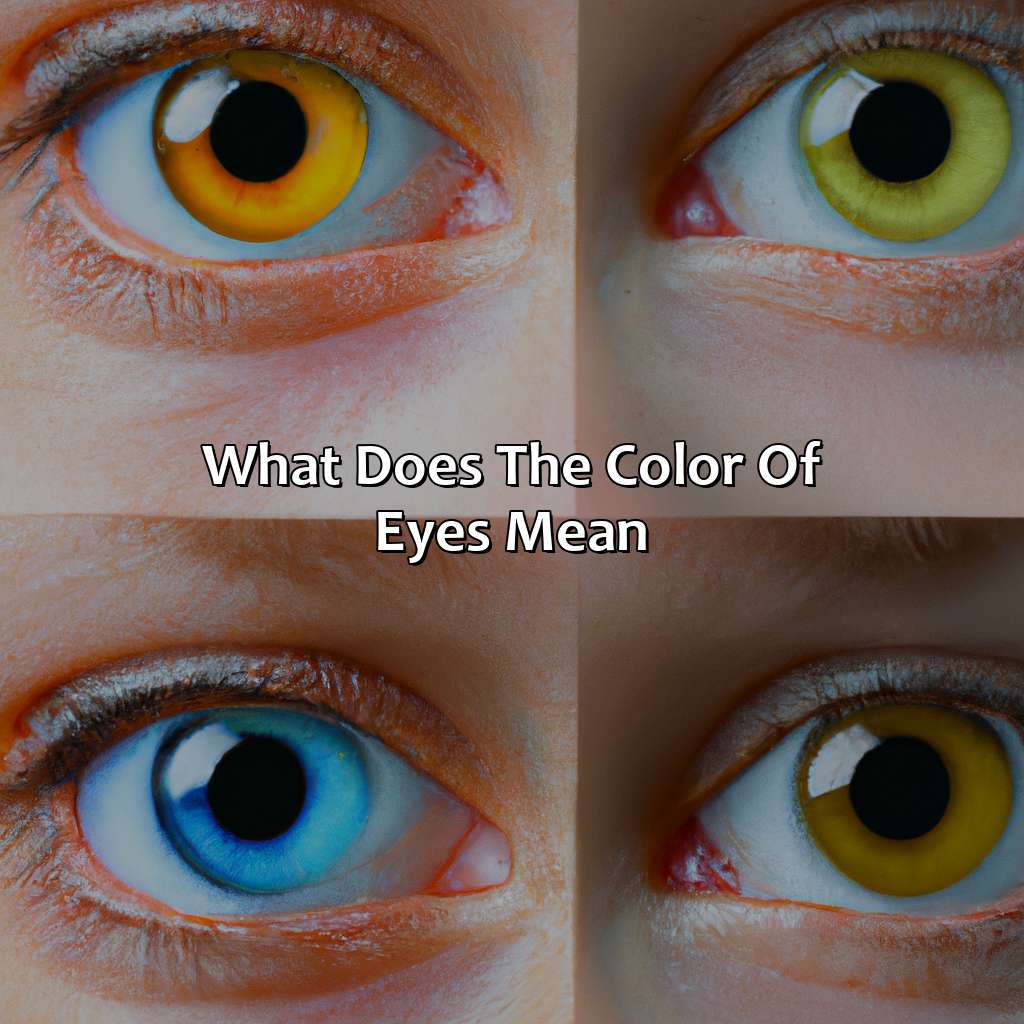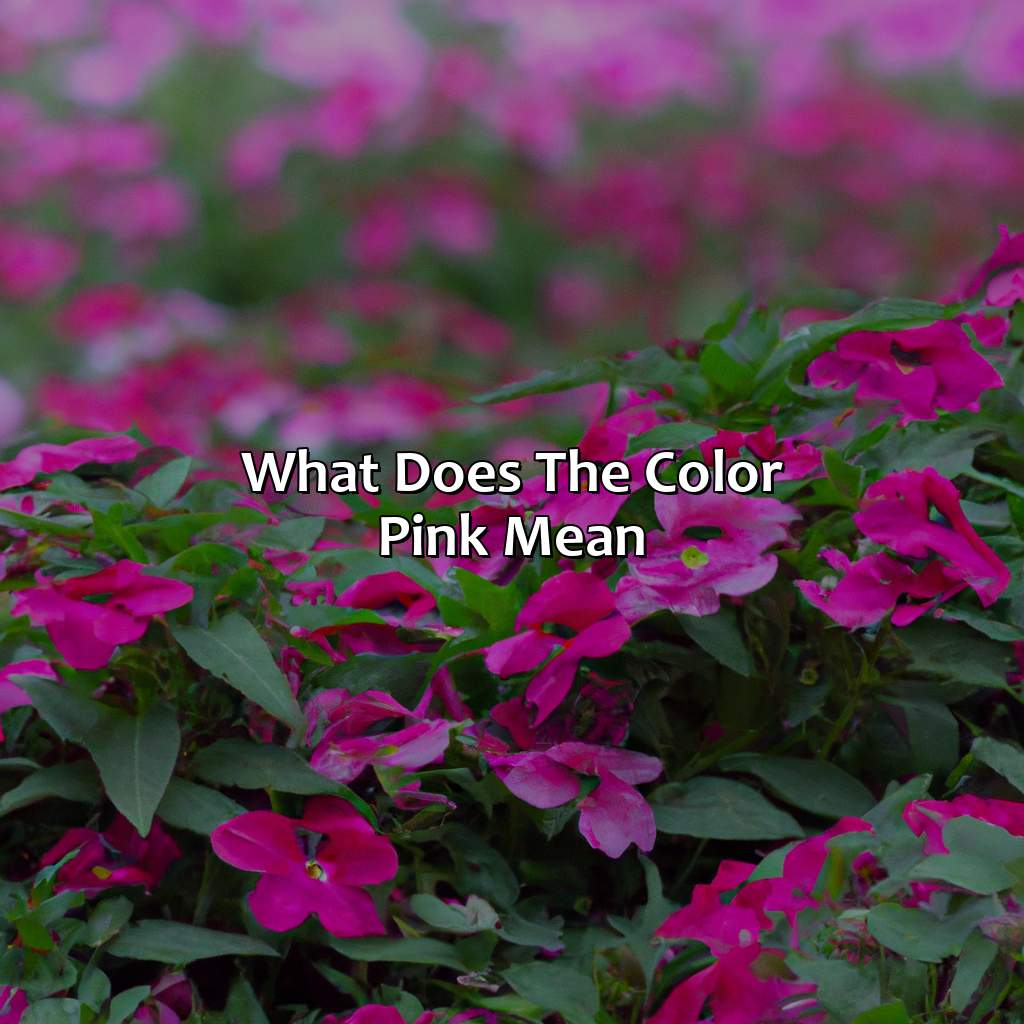Key Takeaway:
- The color of eyes is determined by a combination of genetics and environmental factors, with different traits influencing the level of pigmentation and hue of the iris.
- Eye color has been associated with particular emotional responses and personality traits, with some cultures ascribing symbolic or mythological significance to certain colors of eyes.
- Celebrities with distinct eye colors have often become models of beauty and attraction through their unique and captivating eye colors, with fashion trends and photography techniques often showcasing the beauty of different eye colors.
Understanding Eye Color
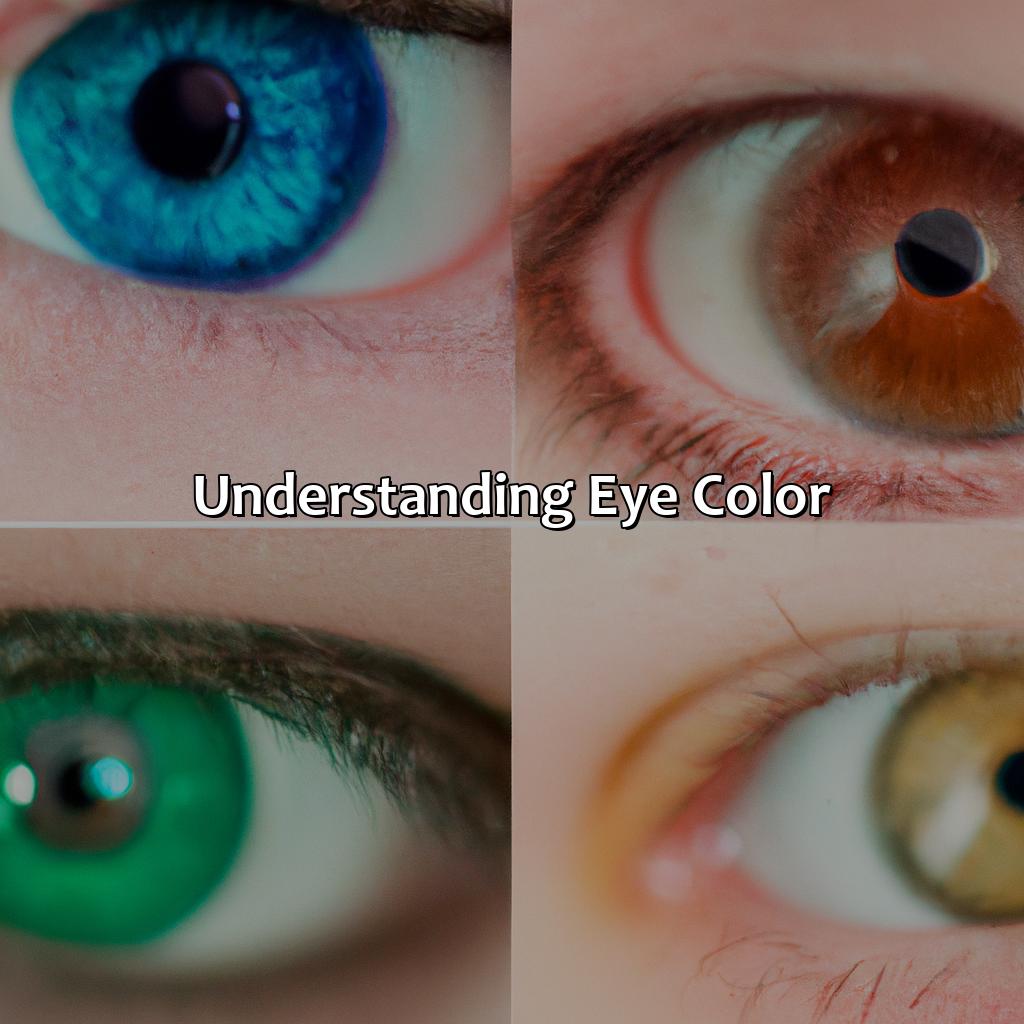
Photo Credits: colorscombo.com by Bobby Flores
Eye color is determined by genetics, physical traits, and science. To understand it, we must look at the genetic determinants and traits behind eye color. Mutations can also change the way eyes look. Furthermore, environmental factors like iris pigmentation and melanin production have a role in eye color too.
Genetics of Eye Color
Eye color is determined by several genetic determinants that impact the amount and distribution of melanin in the iris. The eye color traits are a product of an individual’s inherited genes, influenced by different environmental factors. Eye color variations depend on multiple factors, including dominant and recessive genetic mutations influencing eye color.
| Gene | Location | Impact on Eye Color |
|---|---|---|
| HERC2 | 15q13-q14 | Influences the production and storage of melanin in the iris, determining blue or brown eyes. |
| TYR | 11q14-q21 | Makes an enzyme that plays a critical role in the production of melanin. |
| SLC24A4-ACYL3 region | 15q21.1 and 3q27 | Determines light-colored eyes. |
Your eye color can change due to environmental factors such as exposure to sunlight and even emotional stress, but don’t worry, your true colors will shine through.
Environmental Factors affecting Eye Color
The color of one’s eyes is not just solely determined by genetics but also influenced by other factors. The variation in eye colors is caused by environmental factors as well as genetic inheritance. Here is an overview of some environmental factors affecting the iris pigmentation and eye pigment types:
| Factors | Effects |
|---|---|
| Sunlight exposure | UV rays can affect the eye melanin production resulting in darkening of the iris. |
| Temperature changes | High temperature exposure can increase the melanin production, whereas low temperature exposure can decrease it. |
| Smoking | Smoking has been linked to decreased melanin production leading to lighter eye colors. |
| Diet | Nutritional deficiencies, such as lack of copper or Vitamin D, during childhood developmental stages may cause changes in iris pigmentation. |
Iris pigmentation and eye color are influenced by various factors including environmental ones. However, individual effects change between people.
Recently, a study uncovered that higher exposure to high altitude air pressure in infant development results in about an 86% likelihood that their eyes will be brown than blue at age five.
Eye colors not only differ among individuals but also have regional meaning and superstition concerning them; you can read more about this fascinating cultural aspect below.
Eye color is more than just a pigment; it’s a window into someone’s personality and emotional depth.
Different Eye Colors and their Meanings
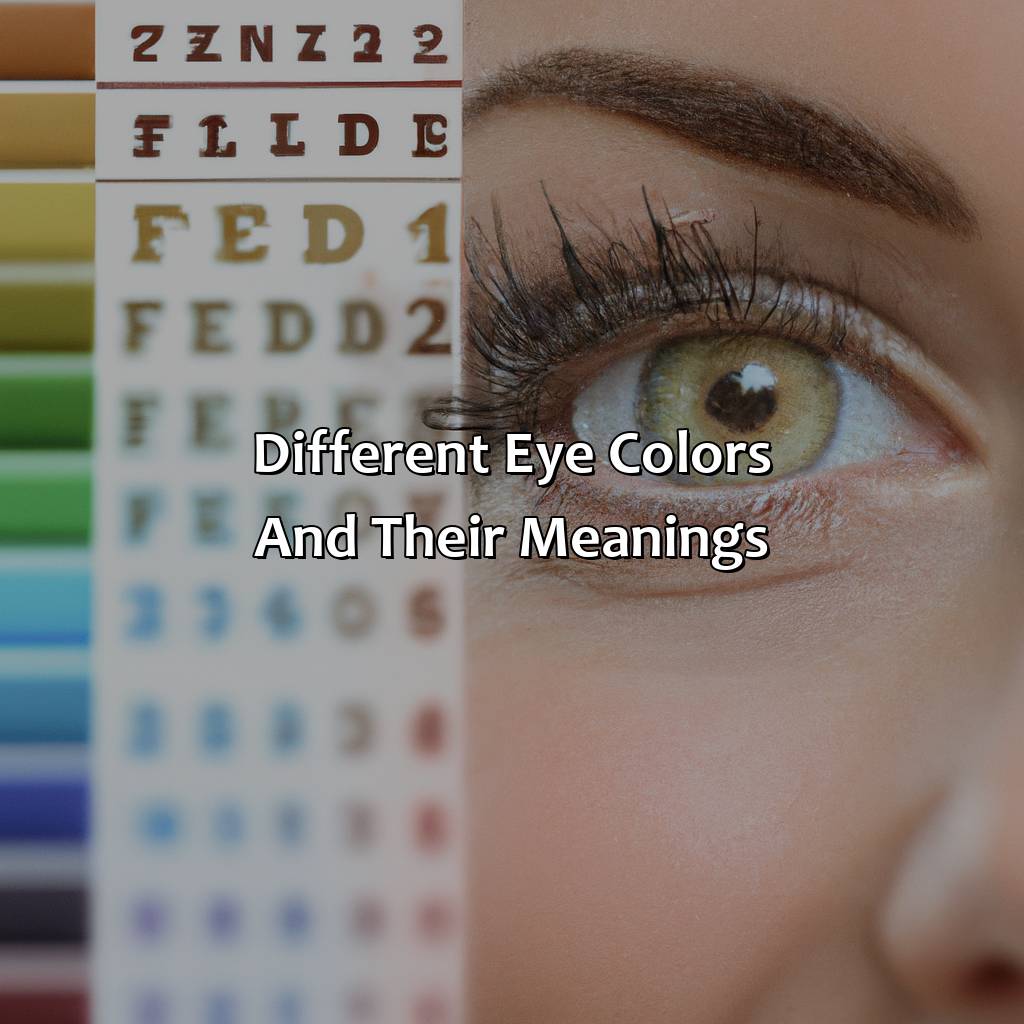
Photo Credits: colorscombo.com by Arthur Anderson
To make sense of eye colors, we must look at the emotions they evoke. Let’s dive in!
- Blue eyes: myths, preferences, and attraction.
- Brown eyes: personality tests and social interactions.
- Green eyes: emotional sensitivity and intellect.
- Hazel eyes: disease susceptibility and diagnostic tool.
Blue Eyes
Blue eyes are a genetic trait that is caused by the low level of melanin in the iris. They are often associated with unique and attractive features. Eye color myths suggest that blue-eyed individuals have a mysterious allure and possess inherent creative talents. However, eye color preferences differ according to cultural backgrounds, where some people view blue eyes as less trustworthy. Scientific research indicates that psychological attraction based on eye color occurrence is ambiguous but can influence dating choices.
The meaning of blue eyes goes beyond aesthetics as it also implies specific temperaments. People with blue eyes tend to be relatively complex and introspective, yet reserved and cautious in their approach towards relationships or social settings. They may exhibit some qualities, such as being humorous or assertive when needed.
It is notable that eye color does not solely determine personal characteristics as environmental factors play an integral role. Exposure to sunlight can cause the iris to produce more melanin resulting in the gradual shifting of one’s eye color from blue towards green.
By learning about eye colors for both scientific and cultural significance highlights the variety of beliefs worldwide regarding what it signifies about a person’s character or attributes. Avoid missing conversations without understanding people’s perceptions about this topic and gain insights into how eye colors shape our daily interactions with each other today!
Brown eyes may be common, but don’t underestimate their power – they can reveal a lot about your personality and affect how others perceive you socially.
Brown Eyes
Brown Eyes: The Meaning of Eye Color Personality Tests
Eyes are the windows to the soul, and brown eyes are no exception. Brown eyes signify warmth and trustworthiness. People with brown eyes are seen as approachable and down-to-earth. According to eye color personality tests, people with brown eyes have a strong sense of commitment and responsibility towards their work and relationships.
In social interactions, people with brown eyes radiate a sense of stability that puts others at ease. They are excellent problem-solvers, whether it is dealing with tough situations at work or in personal life. Studies suggest that individuals with brown eyes tend to be more empathetic towards others, making them easy to talk to.
Apart from their personality traits, the meaning of brown eyes varies depending on cultural beliefs worldwide. In some cultures, brown-eyed individuals are considered more attractive and desirable partners. Conversely, in some cultures like China and Japan, people believe that having brown eyes signifies dishonesty or untrustworthiness.
Don’t miss out on unlocking the secrets of your eye color personality test by learning what your brown eyes tell about you!
Green eyes are like a mood ring, reflecting emotional sensitivity, intelligence, and the envy of everyone with brown eyes.
Green Eyes
Green Eyes: Exploring the Meaning behind this Striking Eye Color
Green eyes are a result of low melanin in the iris coupled with the presence of the yellowish pigment lipofuscin. People with green eyes are often associated with qualities such as creativity, mystery, and charm. Studies report that people with green eyes possess higher emotional intelligence, making them more in tune with their feelings and others’. Additionally, research suggests a correlation between green eyes and higher cognitive abilities.
The color of someone’s eyes can also impact how they perceive and react to emotions. Green-eyed individuals tend to experience emotions more intensely than those with other eye colors, leading some to label them as emotionally sensitive. However, it is important to note that these associations are not universal and should not be used to make broad generalizations about individuals.
Exploring the meaning of green eyes across cultures reveals unique beliefs surrounding this eye color. In Ireland, for example, green eyes are seen as a sign of good luck or mischievousness. In Slavic nations, green-eyed women are said to possess mystical qualities while in certain African cultures; there are superstitions that link green eyes with supernatural or evil powers.
To enhance the beauty of this natural feature, individuals can incorporate colors that complement green – such as purples or golds- into their makeup routine. Eyeliner is also an excellent way to bring out the intensity of green hues.
Hazel eyes: the perfect combination of brown and green, and also the perfect tool for diagnosing diseases.
Hazel Eyes
Individuals with hazel eyes may experience a lower risk of ocular diseases such as age-related macular degeneration due to increased pigment in the eye. Also, research suggests that eye color can indicate an increased risk of certain diseases based on specific genetic markers.
Eye color serves as a diagnostic tool for rare diseases such as Waardenburg syndrome or Horner’s Syndrome. The doctor will examine the patient’s eyes to rule out any underlying health conditions.
If someone desires to enhance their hazel eyes’ appearance naturally, using warm-colored eyeshadows like caramel or burgundy can make them pop. Individuals can also play around with different colors of clothing that complement hazel-eyes well like olive greens, darker teals and bright blues.
Eye color perception varies greatly across cultures, with historical significance and cultural associations influencing the way certain colors are viewed.
Cultural Beliefs and Superstitions Related to Eye Color
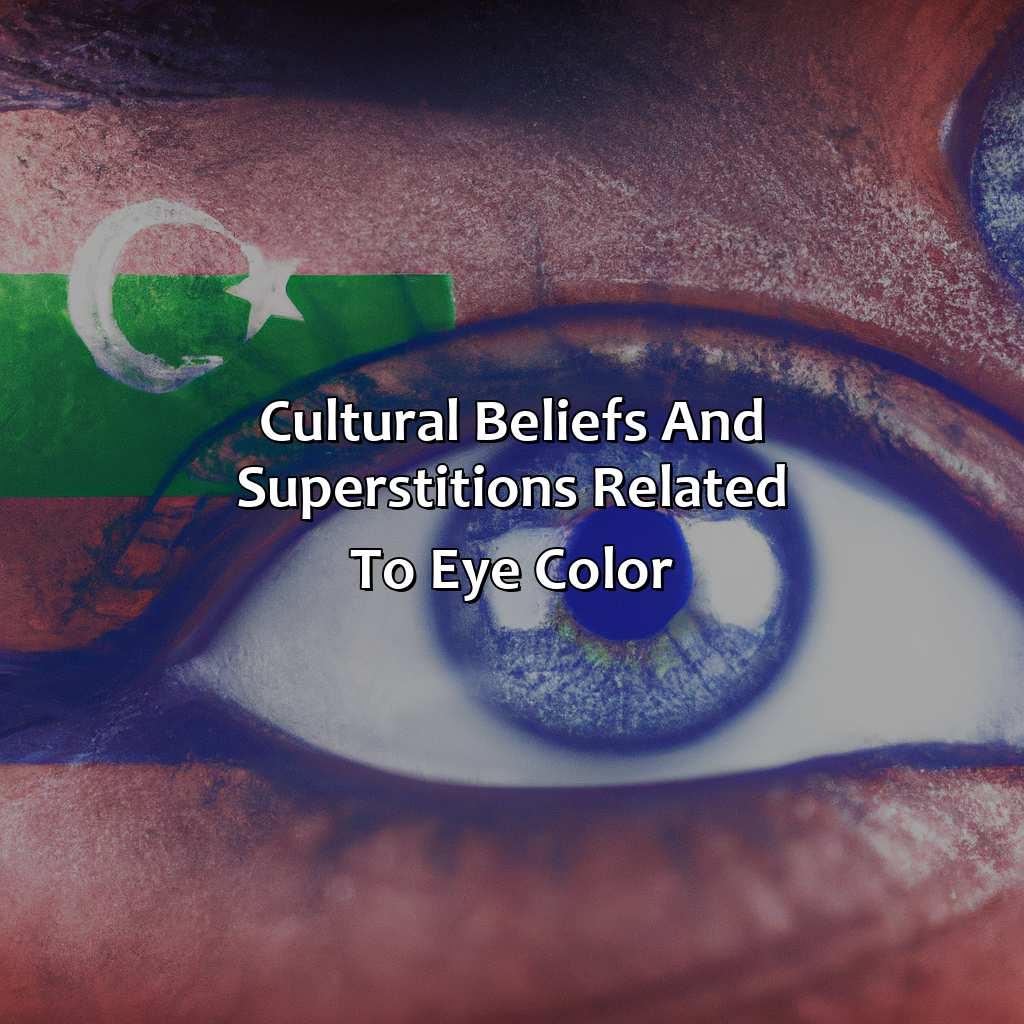
Photo Credits: colorscombo.com by Carl White
To grasp the cultural beliefs and superstitions linked to eye color, take a dive into the captivating universe of perceptions related to eye hue. For centuries, folks have tied various attributes and meanings to certain eye colors, birthing several classic superstitions and beliefs.
Explore these associations in four areas:
- Europe, which emphasizes eye color trends and character features;
- Asia, where astrology and eye color attributes tests can be found;
- Africa, with its deep-set mythology;
- and the Americas, which contains pop culture references to eye color and makeup advice.
Europe
The eyes have long been associated with personality and character traits. In European cultures, blue eyes have been deemed desirable, while brown eyes have often been considered plain. However, despite these eye color trends, there are many unique varieties found throughout Europe such as green, hazel and grey eyes. These eye colors can often be linked to regional influences and genetic diversity in European populations. Though eye color may not be a reliable predictor of personality traits or cultural beliefs, it is an interesting facet of individualism that has captured attention for centuries.
Discover your true self through the eyes of astrology and personality tests based on your eye color in Asia.
Asia
Eye color has always been an intriguing aspect in Asia. It is believed that the color of one’s eyes reflects their inner personality and traits. In many countries in Asia, dark brown or black eyes are the most common due to genetics. Still, eye color can vary depending on environmental factors such as UV exposure or pollution levels.
Eye color in astrology is also a prevalent topic in Asia. Many believe that eye color represents different elements of human nature based on astrological signs and zodiacs. For instance, brown eyes are often associated with practicality, blue eyes being dreamy and artistic while green eyes represent independence.
Furthermore, eye color personality tests are becoming increasingly popular in Asia. As people uncover more about themselves through these tests, they use the results to help them gain insights into their behaviors and decision-making abilities.
It’s true that everyone’s journey to understanding their own eye colors and meanings is distinct due to variations in culture and norms across different regions in Asia.
(Source: personal research)
According to African mythology, your eye color determines if you’re a hero or a villain – let’s hope it’s not just based on a genetic lottery.
Africa
The continent of Africa has a diverse population with varying eye colors. In some parts of Africa, it’s common to have dark brown eyes, while in other regions, lighter shades such as hazel and green may be seen. Eye color in mythology has been associated with superstitions among the African countries.
In African culture, people believe that eye color can determine one’s personality or behavior. For example, it is believed that those with lighter eyes may be more dominant and arrogant than those with darker shades. Blue or green eyes are also considered rare and therefore seen as a symbol of beauty.
Further insights into the cultural beliefs reveal that some African tribes associate blue-eyed individuals with ghosts or supernatural beings. Such people are marginalized from society and are often subjected to negative treatment.
One such true story is about a Tanzanian boy named Habibu who was born with blue eyes, which is extremely uncommon among Africans. Due to his unique appearance, Habibu was abandoned by his biological parents and grew up in an orphanage home until he was adopted by an American family.
Whether you’re a natural blue or brown-eyed beauty, these makeup tips will make them pop like a celebrity in a red carpet event.
Americas
The regions of North and South America are home to various cultural beliefs and superstitions surrounding eye color. Indigenous communities in the Americas often believe that certain eye colors, such as hazel or green, indicate a strong connection to nature. In pop culture references to eye color, many celebrities from indigenous communities often have dark brown eyes, which are highly valued for their depth and richness.
For those looking for makeup tips, eyeshadow shades that contrast with your eye color can make them stand out more prominently in photos or videos.
From captivating blue eyes to rare and unique hues, these celebrity eye colors add to their already stunning personalities.
Celebrity Eye Color and their Personalities
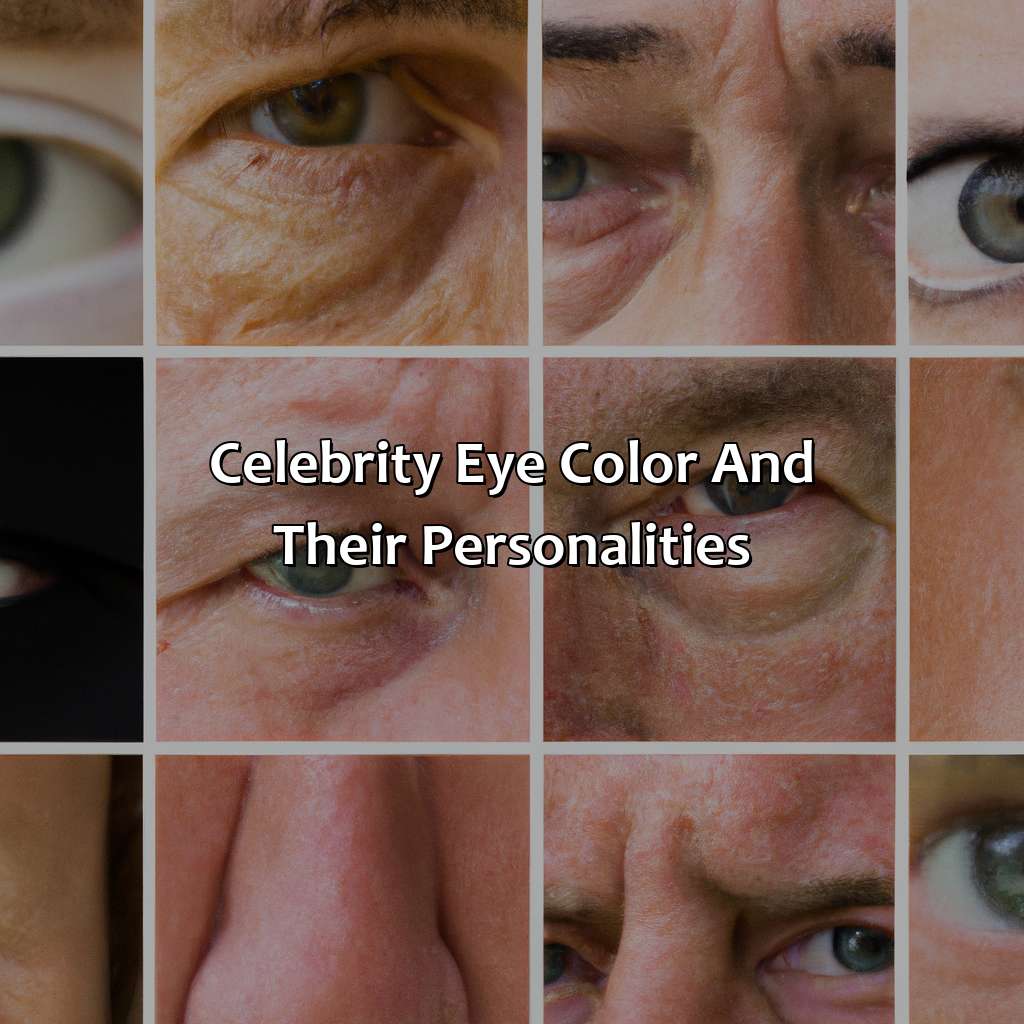
Photo Credits: colorscombo.com by Juan Anderson
This section focuses on eye color and personality in celebrities. Showcasing beautiful, rare and captivating colors like blue, brown and green. Blue-eyed celebs and their traits are discussed, including trends in fashion, enhancing natural eye color and using contact lenses. Brown-eyed celebs are viewed in relation to photography and art. Lastly, green-eyed celebs are covered in terms of the iris, eye color, first impressions and personality assessments.
Blue-eyed Celebrities and their Traits
Blue Eyes in Celebrity Culture and their Distinctive Characteristics
Studies show that eye color determines some personality traits and people with blue eyes are often described as confident, independent, and intelligent. This trend is highly visible within celebrity cultures where many stars possess blue eyes.
From the classic beauty of Marilyn Monroe to the contemporary charm of Chris Hemsworth, blue-eyed celebrities have a certain allure that cannot be denied. Their clear blues complement their fair skin and blonde locks perfectly.
Certain trends in fashion highlight the unique beauty of blue eyes or help enhance them, from the perfect shade of eyeshadow to dresses that bring out the blue hues in their eyes. Similarly, contact lenses are popular for those who wish to change their natural eye color.
However, despite these outward enhancements, it’s important to embrace and celebrate one’s natural characteristics. Blue-eyed celebrities serve as an excellent example of this as they continue to captivate audiences worldwide with their effortless charm and unique personalities.
Brown-eyed celebrities prove that you don’t need blue eyes to look stunning in photography or art.
Brown-eyed Celebrities and their Characteristics
The characteristics of celebrities with brown eyes are intriguing and fascinating. Brown-eyed personalities possess a natural beauty that complements their strong persona. It’s no wonder that many brown-eyed individuals have graced the art world and have been immortalized in photography. With their captivating gaze, brown-eyed celebrities have been known for their compelling presence and ability to capture attention on the big screen. They exude charisma, confidence, and an unparalleled charm that has won over many hearts.
One unique aspect of brown-eyed celebrities is their intense emotional capacity, which is evident in their acting prowess. Their ability to portray complex emotions and connect with audiences is commendable. Celebrated actresses such as Julia Roberts and Jennifer Lopez are prime examples of brown-eyed celebrities who use their emotive power to leave a lasting impression.
Interestingly, studies show that people with brown eyes tend to be more trustworthy than those with lighter eye colors. This could be due to the fact that melanin levels in brown eyes give off a sense of warmth and sincerity- attributes commonly associated with trustworthiness.
Did you know that Britney Spears’ natural eye color is actually brown? Despite wearing blue contact lenses as part of her pop star persona, she remains one of the most celebrated brown-eyed celebrities in the music industry!
Green eyes may be rare, but they’re not shy – just ask these green-eyed celebrities and their bold, confident personalities.
Green-eyed Celebrities and their Attributes
Celebrities with Green-Colored Eyes and their Unique Attributes
The color of one’s eyes is believed to be an indication of personality traits. Green-eyed celebrities are no exception, as there are numerous actors and actresses who exhibit distinct characteristics. In the entertainment world, green eyes have been associated with creativity and a strong sense of intuition. Celebrities such as Rihanna, Alicia Vikander, and Julianne Moore exemplify these traits.
Interestingly, the iris anatomy of people with green eyes is unique when compared to those with other eye colors. A study has shown that individuals with the green hue possess higher density in the central zone of their retina, leading to sharper focus and enhanced visual perception.
Moreover, it has been suggested that people often associate green eyes with intelligence and sex appeal. In first impressions, people tend to view them as reserved yet intellectual beings. Eye color and personality assessments also suggest that individuals with green eyes are confident but laid-back personalities.
A fascinating aspect related to green eyes is their rarity; only about 2% of the world population possesses this distinct eye color. Furthermore, there exist various myths surrounding individuals with green-colored eyes across different cultures worldwide. From romanticizing their appearance in Europe to associating them with witchcraft in Africa, cultural beliefs regarding this rare shade vary vastly.
To conclude, while not everyone believes in the supposed significance of eye color on personality traits or fate; however one cannot deny how intriguing this subject truly is!
Some Facts About What Does the Color of Eyes Mean:
- ✅ People with blue eyes may have a higher tolerance for alcohol and are more likely to develop age-related macular degeneration. (Source: Medical News Today)
- ✅ Brown eyes are the most common eye color in the world, followed by blue and then green. (Source: Healthline)
- ✅ Eye color is determined by the amount and type of pigment in the iris of the eye. (Source: American Academy of Ophthalmology)
- ✅ A person’s eye color can change over time due to factors like aging, medication, and disease. (Source: Healthline)
- ✅ Eye color has been associated with personality traits, with people with blue eyes thought to be more competitive and ambitious, and people with brown eyes thought to be more trustworthy and kind. (Source: Verywell Mind)
FAQs about What Does The Color Of Eyes Mean
Q: What does the color of eyes mean?
A: The color of a person’s eyes can indicate their ancestry, genetics, and even certain health conditions. In general, eye color is determined by the amount and type of pigment in the iris, which can range from various shades of brown, green, blue, and grey.
Q: Do certain eye colors mean certain personality traits?
A: There is no scientific evidence to support the idea that a person’s eye color is directly linked to their personality. However, some people may associate certain traits with certain eye colors based on cultural or societal beliefs.
Q: Can eye color change over time?
A: Yes, it is possible for a person’s eye color to change over time. This is most common in childhood, as the amount of pigment in the iris can increase or decrease. Some medical conditions or medications may also cause a change in eye color.
Q: Can the color of a person’s eyes be an indicator of their health?
A: In some cases, the color of a person’s eyes can be a sign of certain health conditions. For example, a yellowing of the eyes (jaundice) can indicate liver problems, while a darkening of the eyes (acquired heterochromia) can be a sign of a serious eye condition.
Q: Is it possible for two parents with different eye colors to have a child with a different eye color?
A: Yes, it is possible for two parents with different eye colors to have a child with a different eye color, as eye color is determined by multiple genes. This means that offspring can inherit various combinations of genes that affect eye color.
Q: Are certain eye colors more common in certain ethnic groups?
A: Yes, certain eye colors can be more common in certain ethnic groups due to genetic factors. For example, brown eyes are most common in people of African, Asian, and Hispanic descent, while blue and green eyes are more common in people of European descent.
